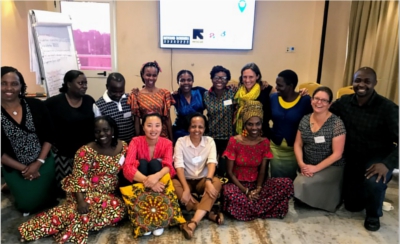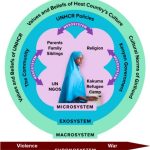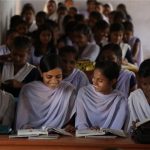GEH Participates in Validation Workshop to Wrap Up 3-Year Learning from SASA! Adaptations Project
In September 2018, UC San Diego Center on Gender Equity and Health researchers, Jennifer Wagman and Eunhee Park, joined colleagues from Raising Voices Uganda, Beyond Borders Haiti, Women’s Promotion Center Tanzania and International Rescue Committee Kenya for a 3-day validation workshop in Kampala, Uganda. Raising Voices – a nonprofit organization working to prevent violence against women and children, worldwide – hosted and facilitated the workshop. The goal of the gather was to share, review and validate draft tools and preliminary research findings from the three-year Learning from SASA! Adaptations Project.
The Learning from SASA! Adaptations Project was launched in 2016, with support from the UN Trust Fund to End Violence against Women. The overarching goal of the project is to learn how the SASA! community mobilization approach for preventing violence against women (VAW) and HIV infection can be adapted for use in different global settings. SASA! was developed by Raising Voices and works by supporting communities through a comprehensive process of social change focused on critically interrogating unequal power dynamics between women and men. A trial conducted in Kampala, Uganda demonstrated SASA! community-level impacts on preventing VAW, and reducing social acceptability of violence and HIV risk factors [read the full report here].
The SASA! trial findings reflect the exciting moment of time we are in. SASA! and other select behavioral approaches have confirmed that VAW can be reduced in a project time frame (as opposed to decades). As such, prevention programmers, researchers, and donors have begun to replicate and scale up these approaches in their settings, with the goals of reaching more communities and broadening public health impact, worldwide. In fact, global uptake of the SASA! methodology has grown exponentially and the approach is currently being used in at least 25 distinct countries. This scale up holds great promise for global prevention of violence and it also presents critical questions, risks and challenges.
The objective of Learning from SASA! Adaptations was to address, examine and offer guidance on key questions, risks and challenges posed by SASA!’s global adaptation. In particular, the project aimed to examine the following questions:
- How can SASA! best be adapted for different settings?
- How is fidelity to SASA! determined?
- What are the promising, context-specified strategies for quality implementation?
The Learning form SASA! Adaptations Project was led by Raising Voices, with support from investigators from the UC San Diego Center on Gender Equity and Health. To achieve the project’s goal of strengthening global prevention programming, a multi-site research design was used to distill learnings from SASA!’s adaptation in three diverse global settings: a Caribbean setting in Jacmel, Haiti; a humanitarian setting in Dadaab, Kenya; and a rural setting in Kigoma, Tanzania. Project activities at reach site were led by a partner organization with an established relationship with Raising Voices, including Beyond Borders in Haiti; International Rescue Committee in Kenya; and Women’s Promotion Center in Tanzania.
Mixed qualitative and quantitative methods were used at each site to explore the SASA! adaptation process and context-specific implementation strategies; learn details about the organization structures and processes needed for effective programming in each setting; and to assess SASA!’s progress against expected outcomes.
During the validation workshop, members from each team reviewed findings from written case study reports from Haiti, Kenya and Tanzania; shared experiences on the data collection and analysis processes; and discussed how key learnings should be integrated into user-friendly draft tools to support SASA!’s global programming. Participants concluded that the SASA! model is adaptable in diverse contexts.
All final project deliverables will be released at separate product launch events, to be held in Uganda, Haiti, Kenya and Tanzania in December 2019. The following products will be availed:
- Comprehensive case study reports from each site
- A comparative brief of findings from all 3 sites
- Several open-source tools




